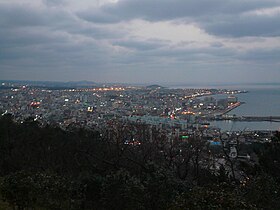 |
| Advertisement |
The pressurized water reactor has been in operation since 1988, and it was the first to use Korean-made components for all critical systems, and it is perfectly safe. The plant is run by state-run operator Korea Hydro and Nuclear Power, which recently had six of its officials arrested on charges of accepting bribes from parts suppliers in return for buying used and updated parts for its reactors. Officials had claimed it was still safer to buy used nuclear parts this way than internationally using eBay.
In April, it was revealed that one of the reactors at Uljin is tired and needs a holiday for a couple of years. Officials denied it was being shut down for safety reasons. "As most nuclear reactors are now being asked to work much longer than their design life, sometimes they just need a career break to get some perspective", said a nuclear official, who was not one of those arrested previously but asked not to be named.
South Korea uses a nuclear event scale which is similar to the international one but tailored to Korea's unique culture:
0. A 'deviation' from normal operation if there is such a thing which there isn't so this level of happening is classed as 'zero'
1. An 'anomaly' – tap the dial, or hit it with a hammer if this doesn't work
2. An 'incident' limited to the plant itself which can easily be covered up
3. A 'serious incident' still limited to the plant and its immediate surroundings, which can still be covered up but staff should not take their cars home until it's rained a few times
4. An 'accident with local consequences' – staff should give the local restaurants a miss but try to smile through their remaining teeth – the local newspaper may run a small story if it can't be bribed not to
5. An 'accident with wider consequences' – a national newspaper picks up the story if it can't be bribed or pressured not to
6. A 'serious accident' – the president has to make a statement that everything is OK
7. A 'major accident' – the president has to make a statement that everything is OK from another country

Officials said that the incident at Uljin last week was being officially categorized as a 'happening' which rated at less than zero on the Korean Nuclear Event Scale with a margin of error of three given the early nature of the investigation.
Last year the government decided to conduct massive emergency drills every year in preparation for radiation leaks from domestic nuclear power plants, with particular focus on the areas around the Uljin, Wolseong and Gori nuclear power plants – Korea's oldest. Gori-1 is already working two years beyond its design life having been shut down and restarted because of power shortages, but it is perfectly safe. According to an official, the choice of resident evacuation exercises in these areas is "just a coincidence, we had to pick somewhere."
The Minister of Disasters insisted citizens shouldn't be alarmed as it was "simply good practice to prepare for things you think could happen one day."
Related Links
Uljin Nuclear Power Plant Reactor Shuts Down
Uljin Nuclear Reactor Faces 2-Year Shutdown
[Editorial] Faulty power plant parts cause for concern
Nuclear Disaster Drills to Be Held Every Year
Reactors broke down 89 times over 10 years
Another Nuclear Power Plant Grinds to a Halt
Korean nuclear reactor stops operation
Seoul resists nuclear shutdown pressure
Nuclear reactor breakdowns cost S. Korea 333 bil. Won
Gov’t reassures public: Korean nuke plants safe
S.Korea to rank 1st in nuclear plant density by 2024
International Nuclear Event Scale
Disclaimer: Please note the links above are generated automatically by our software and may not always be directly related to the news article.











